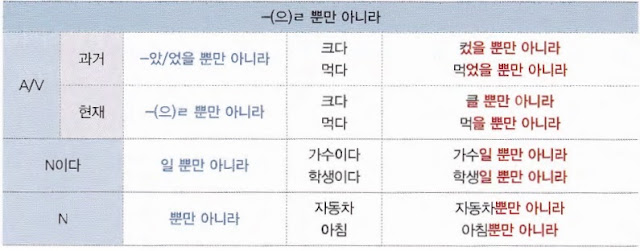가: 호영 씨는 정말 아는 게 많은 것 같아요,
Hoyeong really seems to know a lot.
나: 맞아요. 책을 많이 읽을 뿐만 아니라 매일 신문도 빠짐 없이 봐서 그런 것 같아요.
You’re right. I think it’s because he not only reads a lot of books, but he also reads the paper every day without fail.
가: 강원도로 여행을 갈까 하는데 어떨까요?
I’m thinking about taking a trip to Gangwondo. What do you think (about such a trip)?
나: 좋지요, 강원도는 산이 많을 뿐만 아니라 바다도 있어서 여행하기에 아주 좋은 곳이에요.
I like it. Gangwondo not only has a lot of mountains, but it also has beaches, so it is a very good place to visit.
This expression is used to indicate “not only what is stated in the preceding clause, but also what is stated in the following clause”. This expression can also be used without 만 as in -(으)ㄹ 뿐 아니라.
 가: 강남역에서 만날까요?
가: 강남역에서 만날까요?
Shall we meet at Gangnam Station?
나: 거기는 멀 뿐만 아니라 교통도 복잡하니까 다른 데서 만납시다.
It’s not only far away, but the traffic there is really bad, so let’s meet somewhere else.
가: 양강 씨는 버스보다 지하철을 자주 타나 봐요.
It seems you (Yang Gang) takes the subway more than the bus,
나: 지하철은 시간을 정확하게 지켜줄 뿐 아니라 편리해서 자주 이용합니 다.
The subway not only runs on a more precise time schedule, but it’s also more convenient, so that’s why I use it.
가: 왜 그렇게 허겁지겁 먹어요?
Why are you eating in such a rush?
나: 저녁뿐만 아니라 점심도 굶어서 배가 너무 고파요.
I’m so hungry because I skipped not only lunch but dinner as well.
1. When using this expression, if the preceding clause is a positive statement, then the following clause must also be a positive statement, and vice versa.
• 우리 집은 학교에서 가까울 뿐만 아니라 아주 시끄러워요. (X)
->우리 집은 학교에서 가까울 뿐만 아니라 아주 조용해요.(〇)
2. The expressions A/V-기까지 하다,A/V-기도 하다 and N까지 A/V are often used in clauses following -(으)ㄹ 뿐만 아니라.
• 자야 씨는 예쁠 뿐만 아니라 성격이 좋기까지 해요.
= 자야 씨는 예쁠 뿐만 아니라 성격이 좋기도 해요.
= 자야 씨는 예틀 뿐만 아니라 성격까지 좋아요.
01 -(으)ㄹ 뿐만 아니라
02 -(으)ㄴ/는 데다가
03 조차
04 만 해도
>> Full of Intermediate grammar: Click here

